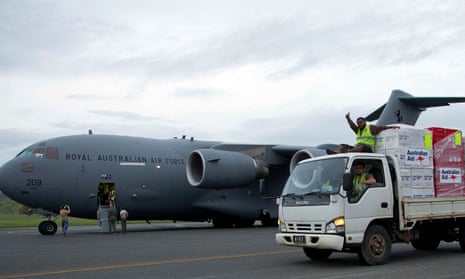Australia is behind its allies in preparing for climate change, exposing defence personnel – and the country more broadly – to considerable strategic risk and uncertainty, a new report written by the former defence force chief, Admiral Chris Barrie, warns.
More than half the world’s natural disasters last year occurred in the Asia-Pacific region and the Australian defence force was increasingly being called upon to provide humanitarian assistance to affected areas, the Climate Council report said.
Although climate change was increasing the frequency and severity of many extreme weather events in the region, the report cited weak government action on climate change as undermining the ADF’s ability to respond.
“The US has mandated that their military forces address the risks of climate change as a routine part of all mission planning,” the report said.
“In Australia, comparatively less action is being taken by the government to ensure the Australian defence force is prepared for the security risks posed by climate change. This is particularly concerning because Australia and the Asia-Pacific are on the frontline of climate change and its impacts.”
The defence minister, Marise Payne, was asked at a press conference in Canberra on Tuesday if the government’s defence white paper should include a strategy for how to respond to the threat posed by climate change.
“I’m not going to go into the details of the white paper,” Payne said.
“I have not had a chance to be briefed on the submission process yet, but after that I am sure I will form a view and we will be able to talk further.”
The report said strong action to reduce greenhouse gas emissions would be critical to reduce these security risks, given that climate change was a “threat multiplier” that made unstable conditions worse by exacerbating food and water scarcity.
“These threats, in turn, can contribute to political instability and social tensions that result in violence and conflict,” it warned.
“Projected sea-level rise, coastline retreat and the eventual submergence of small low-lying islands may affect the maritime boundaries of nations and alter exclusive economic zones in which natural resources are located. This may intensify existing regional tensions and contribute to new conflicts over natural resources.”
Rising temperatures would also make it more difficult for ADF staff to train, exposing them to heat stress, and training ranges risked being wiped out or damaged.
“The 2013 state mine fire, one of New South Wales’s biggest ever bushfires, was caused by inadequate defence planning, in which high explosive tank rounds were detonated on a day of high bushfire danger,” it said.
“Climate change is one of the largest long-term global challenges humans have faced in the history of civilisation. The implications for the security sector and defence forces are formidable.”
Prof Will Steffen, of the Climate Council, said he was confident that the new Turnbull government would take the findings of the report seriously.
Steffen said he would meet Payne next month and hoped to brief her more extensively on the report.
“The need to get greenhouse gas emissions down is a big issue requiring much discussion and it’s my feeling that this new leadership will be much more open to exploring how we can do that,” he said.
“We also need climate change to be mainstreamed into defence planning. Without acting we will face much more serious consequences than we are now, within a couple of decades.”

Comments (…)
Sign in or create your Guardian account to join the discussion